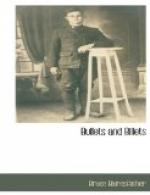I went into the yard and walked across the dirty cobbles to the front door. The people were most pleasant. I didn’t understand a word they said; but when a person pushes a flagon of beer into one of your hands and an apple into the other, one concludes he means to be pleasant, anyway.
I mumbled a lot of jargon to them for some time, and I really believe they saw that I wanted to use their place for a billet. The owner, a man of about forty-five, then started a long and hardy discussion right at me. He put on a serious face at intervals, so I guessed there was something rather important he was trying to convey to me. I was saved from giving my answer by catching sight of my pal, the transport officer, crossing the yard. He came in. “I’ve brought Jean along to talk,” he announced. (Jean was our own battalion interpreter.) “I can’t find a place; but this looks all right.” Jean and the owner at once dived off into a labyrinth of unintelligible words, from which they emerged five minutes later. We sat around and listened. Jean turned to us and remarked: “They have got fever here, he says, what you call the spotted fever—how you say, spotted fever?—and this farm is out of bounds.”
“Oh! spotted fever! I see!” we both said, and slid away out of that farm pretty quick. So that was what that farmer was trying to say to me: spotted fever!
I went down the road wondering whether cerebral meningitis germs preferred apples or beer, or perhaps they liked both; awful thought!
We went back to our original selection and decided to somehow or other squeeze into the farm which we thought too small. Many hours later we got the transport and the machine-gun section fixed up. We spent two nights there. On the second day I went up into Bailleul. Walking along in the Square, looking at the shops and market stalls, I ran into the brigade machine-gun officer.
“Topping about our brigade, isn’t it?” he said.
“What’s topping?” I asked.
“Why, we’re going to have about ten day’s rest; we clear off out of here to-morrow to a village about three miles away, and our battalion will billet there. Where we go after that I don’t know; but, anyway, ten days’ rest. Ten days’ rest!!”
“Come and split one at the Faucon d’Or?”
“No thanks, I’ve just had one.”
“Well, come and have another.”
CHAPTER XXVI
A PLEASANT CHANGE—SUZETTE, BERTHE AND
MARTHE—“LA JEUNE FILLE FAROUCHE”—ANDRE
On the next morning we left Bailleul, and the whole of our battalion marched off down one of the roads leading out into the country in a westerly direction. The weather was now excellent; so what with a prospect of a rest, fine weather and the departure from the Wulverghem trenches, we were all very merry and bright, and “going strong” all round. It seemed to us as if we had come out of some dark, wet under-world into a bright, wholesome locality, suitable for the habitation of man.




